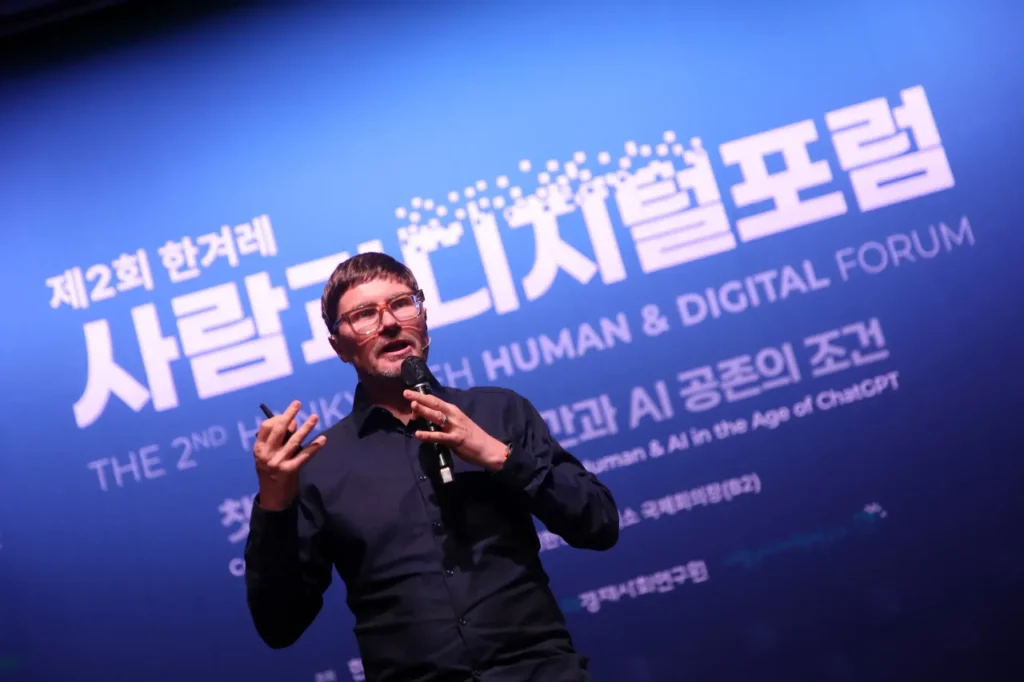By Professor Drew Hemment and Dr Cody Kommers
The rapid advancement of artificial intelligence is driving an evolving consensus: the humanities are more crucial than ever for understanding and shaping the future of AI.
We need the humanities not just to contribute to analyse the effect of AI on societies, but to help shape fundamental aspects of the technology itself.
Kerouac at the keyboard
There’s a clear reason why we need artists, sociologists, historians and poets at the computer terminal.
Today’s AI landscape is undergoing a profound “qualitative turn”. For most of its history, AI’s lingua franca was numbers. Its outputs and interfaces were primarily numerical.
Large language models (LLMs) such as ChatGPT have changed that. You don’t need to code to interact with AI or shape its outputs today—you just need to be able to hold a conversation.
The result of LLMs is that AI systems are producing outputs more akin to literature than traditional computation. Yet these systems, built on homogeneous architectures, struggle to capture the richness of human meaning and cultural diversity.
Recent breakthroughs at companies like DeepSeek, which hired humanists to develop their latest models, signal an emerging realization: technical expertise alone cannot address AI’s most critical challenges.
We stand at a pivotal moment, equivalent to the birth of Cognitive Science in the 1950s. There is an urgent need—and a closing window of opportunity—to shape the next generation of AI technologies with greater interpretive capabilities and that support human flourishing by fostering creativity, collaboration, and critical thinking.

What social media got wrong
We have a warning from recent history about what happens if we get this wrong and the quality of the data is ignored in favour of its quantity: social media.
Social media platforms gave insufficient credence to the content of the data being produced and shared on their platforms. Instead they relied on ‘thin’ metrics that measured the scale of the data – the number of likes, shares, comments—to gauge the its worth or nature.
Put simply, they didn’t care about what was being said on their platforms, they just wanted more of it being said. They were optimized for attention.
The result was relatively homogenous systems and algorithms which have had a large-scale influence on how we process the world, supercharged the spread of misinformation, and created echo chambers that have harmed humanity’s emotional well-being.
The problem of social media’s uniformity comes down to the business models of the tech companies and who was in the room when their systems were designed. The majority of the researchers working on this problem tend to draw on the same references—computer circuits and neural connections.

Doing AI Differently
But if we agree that AI is evolving—and it is—then so must our approach to it. Otherwise we’re doomed to repeat the mistakes of social media and we’ll lose the next decade in AI development.
We argue that, working with engineers, scholars from the humanities can offer a distinct set of perspectives and approaches that challenge the core assumptions of how AI is designed.
This is at the heart of a groundbreaking international initiative that is challenging how we develop these powerful technologies. Doing AI Diffrerently argues that the humanities must play a central role in shaping the very foundation of how AI is built—to create AI that enhances, rather than diminishes, human ingenuity.
The initiative—a collaborative effort across The Alan Turing Institute, University of Edinburgh, AHRC, and other UK and North American institutions—is calling for a fundamental shift in AI development by positioning the humanities as integral, rather than supplemental, to technical innovation.
The way AI is designed today will shape the next decade. This is our moment to do AI differently—for the humanities and engineering to collaborate as equals to create AI that amplifies human potential, respects cultural diversity, and preserves our agency in an increasingly automated world.
Doing AI Differently is just getting started—a white paper and international workshop are just the beginning. We will chart this bold new course for AI’s future, bringing together researchers of the highest levels from the humanities and engineering to build new collaborative efforts addressing AI’s most pressing questions with humanistic perspectives.
We invite everyone to join the conversation and help shape the future of AI.
Further links and information
Join us for the third iteration of The New Real Salon, which introduces their new international initiative, Doing AI Differently, on 29 April 2025. The event is part of Edinburgh Futures Institute’s Making Waves: Spring 2025 season.
Image credits: main image – Yutong Liu & Kingston School of Art / Better Images of AI / Talking to AI 2.0 / CC-BY 4.0; Drew Hemment – Drew Hemment; social media – Getty/GeorgeClerk





